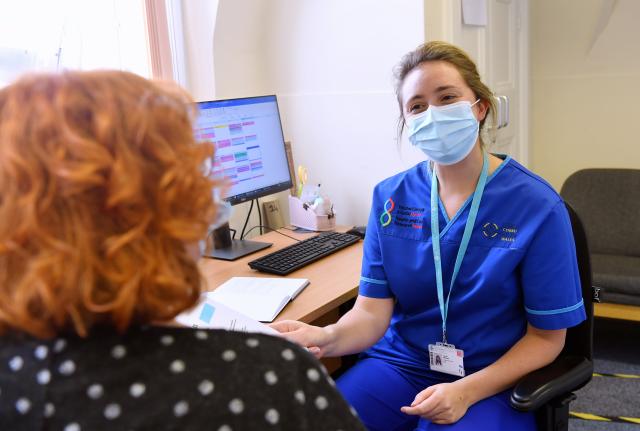
Welsh researchers to help develop app that could improve quality of life for terminally ill cancer patients
15 June
Welsh researchers are part of a European team awarded funding to create an app that will help terminally ill cancer patients to make informed decisions about their medication.
Many patients with cancer receive medication to reduce the ability of the blood to clot, reducing the risk of thrombosis.
These medications, known as antithrombotics, is often continued until the end of a patient’s life, despite side effects such as bleeding, and the associated reduced quality of life.
A European consortium, co-led by the Leiden University Medical Centre (LUMC) and Cardiff University, has been awarded a Horizon Europe grant of 6 million euros to create an online app that enables shared decision making between doctors and patients regarding continuing or stopping their antithrombotic medication.
The online app is being developed through the SERENITY project, led by Simon Noble, Marie Curie Professor in Supportive and Palliative Medicine at Cardiff University and Health and Care Research Wales grant holder, and Erik Klok, Professor of Medicine at the LUMC in the Netherlands.
Health and Care Research Wales funded organisations - Wales Cancer Research Centre, PRIME Centre Wales and the Secure Anonymised Information Linkage (SAIL) Databank - are all involved in the project.
The dedicated online decision aid and app will use questions to start the conversation between a doctor and patient and assess the patient's individual risk of bleeding and thrombosis.
Professor Simon Noble said: "Only rarely are these medications discontinued during the last phase of life. This is due to the lack of scientific evidence, but also because death and dying are often not discussed sufficiently by the treating physician.
"We want to tailor the app as much as possible to the individual patient. It will take into account factors such as gender, tumour type and past thrombosis / bleeding history. The questions in the app will be adjusted accordingly.
The app will not indicate whether the patient should stop taking medication.
"The app does not give advice but makes discontinuing medication negotiable,” added Professor Noble. “The final decision lies with the patient, giving them more control over their own disease process. Most importantly, it helps them to consider the evidence within the context of their own personal preferences and values.”
Cardiff University and LUMC are collaborating with 14 institutions across Europe to develop the app. The first two years of the SERENITY project will be dedicated to epidemiological and qualitative research and app development. The opinions of doctors and patients will be central to this.
“After that, we will test the app in practice,” said Professor Noble. “We will compare the results of patients who have used the app with those who have not. Our expectation is that the app will lead to the appropriate use of antithrombotic medication, prevention of bleeding complications and significant cost savings, in addition to an improvement in the quality of life and treatment satisfaction of patients, their carers and the healthcare professionals involved.”
Professor Kieran Walshe, Director of Health and Care Research Wales, said:
“This type of research is essential if we want to make a real difference to the treatment and care of patients. I’m proud to see our funded organsiations contributing to this research and app development, which will ultimately help patients and doctors make informed decisions together.”
Professor Annmarie Nelson, Programme Lead Optimised Patient Experience, Wales Cancer Research Centre and Marie Curie Professor of Palliative and Supportive Care, said:
“I am delighted to be a part of this international team working with Professor Noble on the qualitative work package, which gathers the views of patients, families and healthcare professionals across four countries. Discontinuing treatment is a sensitive topic at end of life for all concerned. Our work with patients and families will indicate how we can minimise potential distress when considering options.”
Professor Adrian Edwards, Director of PRIME Centre Wales, said:
“We are delighted that this research will use the expertise in PRIME for patient-centred care, shared decision-making and palliative and supportive care. It will make a big difference for patients and families at extremely difficult stages of life and illness by enabling them to make treatment decisions based on what is most important to them personally.”
Ashley Akbari, Senior Research Manager and Data Scientist at Swansea University’s SAIL Databank, said:
“We are excited to be involved in this truly innovative project that will involve and support patients, health care professionals, researchers and members of the public. We will be able to leverage the rich anonymised individual-level, population-scale data held in SAIL, utilising SAIL’s world-leading trusted research environment and Population Data Science group at Swansea University data science expertise, to evaluate what this project will mean for cancer patients receiving end-of-life care.”